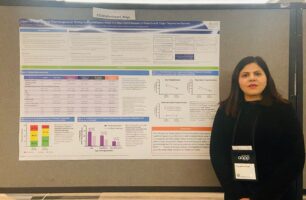
While not recommended, some people may reduce or abruptly stop taking their medication without or against medical advice. An article in Harvard Health warns that doing so without medical advice may cause the patient to experience symptoms related to depression relapse.
Further, if people stop taking antidepressants, they may experience symptoms of antidepressant withdrawal. Antidepressant withdrawal describes new symptoms experienced shortly after discontinuing an antidepressant. Those symptoms may be remembered using the mnemonic FINISH, described in an article in the Canadian Medical Association Journal (CMAJ) as:
“Flu-like symptoms (lethargy, fatigue, headache, achiness, sweating)
Insomnia (with vivid dreams or nightmares)
Nausea (sometimes vomiting)
Imbalance (dizziness, vertigo, light-headedness)
Sensory Disturbances (“burning,” “tingling,” “electric-like,” or “shock-like” sensation)
Hyperarousal (anxiety, irritability, agitation, aggression, mania, jerkiness)”
Further, the CMAJ article states that approximately 20% of patients who stop taking their antidepressant medication may experience withdrawal symptoms, and the incidence may vary depending on the antidepressant prescribed.
Distinguishing Antidepressant Withdrawal from Depression Relapse
If a patient is complaining about these symptoms after they stop taking their medication, you may consider investigating their cause. Some symptoms of antidepressant withdrawal, like tiredness, anxiety, and irritability, may overlap with symptoms of depression.
Harvard Health describes the key differences between discontinuation symptoms and depression relapse as:
- “Discontinuation symptoms emerge within days to weeks of stopping the medication or lowering the dose, whereas relapse symptoms develop later and more gradually.
- Discontinuation symptoms disappear quickly if you take a dose of the antidepressant, while drug treatment of depression itself takes weeks to work.
- Discontinuation symptoms resolve as the body readjusts, while recurrent depression continues and may get worse.
- Discontinuation symptoms often include physical complaints that aren’t commonly found in depression, such as dizziness, flulike symptoms, and abnormal sensations.”
If one or more of these symptoms persist for more than one month and are worsening, your patient may be experiencing depression relapse.
Antidepressant Discontinuation Treatment Must be Individualized
Healthcare providers may struggle with creating an antidepressant withdrawal strategy to help their patients. This is because clinical studies have yet to find a causal link between tapering strategies and symptom prevention.
“It is very hard to find detailed, professionally approved guidelines for tapering and discontinuation of antidepressants,” write Ronald Pies, MD, and David Osser, MD, in Psychiatric Times.
Researchers in an article in Psychotherapy and Psychosomatics say:
“Even though gradual tapering of SNRI appears to be a reasonable clinical strategy, it does not prevent the onset of withdrawal phenomena. Indeed, we do not have a clear and specific set of sociodemographic, clinical, and neurobiological characteristics that may be associated with increased vulnerability to the onset of withdrawal syndromes.”
Research published in CMAJ concludes, “management of antidepressant discontinuation syndrome needs to be done on an individual basis because of a lack of specific treatment data.”
Antidepressants Withdrawal Best Practices
A lack of definite guidelines does not mean clinicians are in the dark when developing a discontinuation plan. An understanding of how antidepressants work may help clinicians decide which strategy best fits their patients. For example, healthcare providers may consider the type of antidepressant and prescription duration, as well as the side effects associated with use.

Further, according to Harvard Health, withdrawal symptoms occur as neurons readjust to effects in neurotransmitter activity caused by the reduction of antidepressant use.
Harvard Health adds that drugs or medications that are processed quickly (e.g., paroxetine and venlafaxine) have been shown to cause more intense withdrawal symptoms. Slower processed medications (e.g., fluoxetine) may cause fewer problems related to discontinuation.
This has led some researchers, like those cited in an American Journal of Psychiatry (AJP) article, to theorize that withdrawal may be linked to a reduction in serotonin – the same chemical messenger that is increased as a result of taking selective serotonin reuptake inhibitors (SSRIs).
Their review of studies on the topic found, “a greater prevalence of symptoms after discontinuation of SSRIs with shorter half-lives suggests a role for reduced availability of serotonin in the central nervous system with decreasing levels of SSRIs.” However, the authors note that other neurotransmitters in the brain (in addition to serotonin) seem to be affected by discontinuation of SSRIs. Further, the researchers argue “the strongest evidence for a pharmacological mechanism is inferred by rapid resolution of discontinuation symptoms by reinitiation of SSRI medication.”
As a result, Harvard Health says, “many of the symptoms of SRI discontinuation syndrome can be minimized or prevented by gradually lowering, or tapering, the dose over weeks to months, sometimes substituting longer-acting drugs such as fluoxetine (Prozac) for shorter-acting medications.”

Other withdrawal risk factors from the discontinuation of antidepressant drugs mentioned in the AJP article include “earlier age at onset of depression, comorbid conditions such as panic disorder, and a past history of discontinuation symptoms.”
Mitigating Antidepressant Withdrawal

During tapering, healthcare providers should ask patients to give regular updates on their treatment progress in order to identify potential withdrawal symptoms and recommend a remedy.
Harvard Health suggests the following may help mitigate antidepressant withdrawal:
- Give patients time. Even if your patients report symptom improvement, depression may reoccur if patients stop taking antidepressants too quickly. Harvard Health suggests “clinicians generally recommend staying on the medication for six to nine months before considering going off antidepressants. If you’ve had three or more recurrences of depression, make that at least two years.”
- Plan. Help your patients stick to a gradual tapering plan for antidepressant medication by creating a calendar of recommended doses over the course of multiple months. Encourage them to keep a “mood calendar” to report and track their progress and mood.
- Encourage a healthy lifestyle. Keeping a healthy lifestyle remains important during discontinuation of antidepressant drugs. Encouraging good nutrition, regular exercise and appropriate sleep may alleviate depression symptoms. It may also help to balance changes in your patient’s serotonin levels as they taper from medications that target the serotonin system.
Provide support. Stay in touch with your patient throughout the process. Monitor the severity of any symptoms at least once a month to evaluate if changes to the plan are needed.
While more research on its causes is needed, preparing and educating your patients on the risk factors related to withdrawal from antidepressants and the potential for relapse is an important step in helping them distinguish their Major Depressive Disorder symptoms and antidepressant drug withdrawal symptoms.
Our articles are for informational purposes only and are reviewed by our Medical Information team, which includes PharmDs, MDs, and PhDs. Do not make any changes to your current medications or dosing without consulting your healthcare provider.
The GeneSight test must be ordered by and used only in consultation with a healthcare provider who can prescribe medications. As with all genetic tests, the GeneSight test results have limitations and do not constitute medical advice. The test results are designed to be just one part of a larger, complete patient assessment, which would include proper diagnosis and consideration of your medical history, other medications you may be taking, your family history, and other factors.
If you are a healthcare provider and interested in learning more about the GeneSight test, please contact us at 855.891.9415. If you are a patient, please talk with your doctor to see if the GeneSight test may be helpful.






